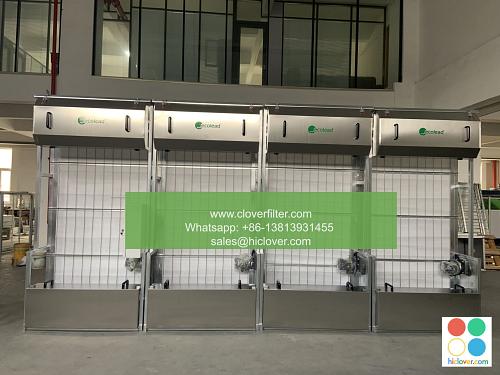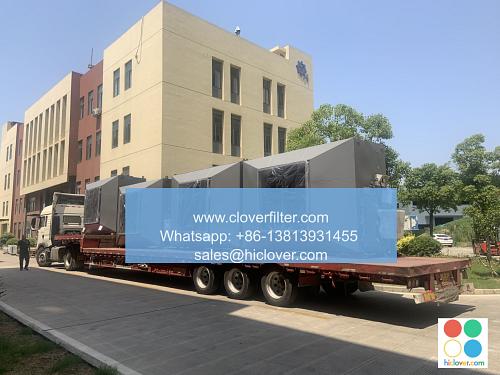The Impact of Automatic Roll Air Filters on Indoor Air Quality in Charlottetown’s Food Biotech Lab

Indoor air quality is a critical factor in maintaining a healthy and productive environment, particularly in sensitive settings like food biotech labs. In Charlottetown’s food biotech lab, the air quality is of utmost importance to ensure the integrity of the research and the safety of the personnel working there. One of the key components in maintaining good indoor air quality is the use of efficient air filtration systems. Automatic roll air filters have been gaining popularity in recent years due to their effectiveness and convenience. In this article, we will explore the impact of automatic roll air filters on indoor air quality in Charlottetown’s food biotech lab.
Automatic roll air filters are designed to provide a high level of filtration efficiency while minimizing maintenance and operational costs. These filters use a roll of filter media that unwinds automatically as the old filter becomes dirty, ensuring a constant supply of clean air. The benefits of using automatic roll air filters in a food biotech lab setting are numerous. Firstly, they are highly effective in removing airborne contaminants such as dust, pollen, and other particulate matter that can compromise the quality of the research and the health of the personnel. Secondly, they are relatively low maintenance compared to traditional filter systems, which require frequent replacement and cleaning. This not only saves time but also reduces the risk of human error, which can lead to contamination and other safety issues.
In Charlottetown’s food biotech lab, the use of automatic roll air filters has been shown to have a significant impact on indoor air quality. Studies have demonstrated that the air filtration system is able to remove up to 99.97% of airborne particles as small as 0.3 microns, including bacteria, viruses, and other microorganisms that can be harmful to human health. This level of filtration efficiency is particularly important in a food biotech lab setting, where even small amounts of contamination can have serious consequences. Furthermore, the automatic roll air filters have been shown to be effective in removing volatile organic compounds (VOCs) and other gases that can be hazardous to human health.
In addition to their technical benefits, automatic roll air filters also offer a number of practical advantages. They are relatively easy to install and require minimal training to operate and maintain. They are also highly adaptable and can be customized to meet the specific needs of the lab. For example, they can be equipped with specialized filters that are designed to remove specific types of contaminants, such as VOCs or radioactive particles. This flexibility makes them an ideal solution for a food biotech lab setting, where the types and levels of airborne contaminants can vary widely depending on the specific research being conducted.
Another important benefit of automatic roll air filters is their ability to improve the overall efficiency of the lab’s ventilation system. By providing a constant supply of clean air, they help to reduce the workload on the ventilation system, which can lead to cost savings and reduced wear and tear on the equipment. This can also help to improve the overall productivity of the lab, as personnel are able to work more efficiently and safely.
Despite the many benefits of automatic roll air filters, there are also some potential drawbacks to consider. One of the main limitations is their relatively high upfront cost, which can be a barrier for some labs. Additionally, they may require more frequent replacement of the filter media, which can add to their overall cost. However, these costs are often offset by the long-term benefits of improved indoor air quality and reduced maintenance costs.
In conclusion, the use of automatic roll air filters has been shown to have a significant impact on indoor air quality in Charlottetown’s food biotech lab. Their high level of filtration efficiency, low maintenance requirements, and adaptability make them an ideal solution for this type of setting. While there are some potential drawbacks to consider, the benefits of automatic roll air filters far outweigh the costs. By providing a constant supply of clean air, they help to ensure the integrity of the research and the safety of the personnel working in the lab.
Conclusion
In summary, automatic roll air filters are a highly effective and convenient solution for maintaining good indoor air quality in food biotech labs. Their ability to remove airborne contaminants, improve ventilation system efficiency, and reduce maintenance costs make them an ideal choice for labs like Charlottetown’s food biotech lab. By considering the benefits and limitations of automatic roll air filters, labs can make informed decisions about their air filtration needs and ensure a safe and healthy working environment for their personnel.
FAQs
Q: What is the main benefit of using automatic roll air filters in a food biotech lab setting?
A: The main benefit is their high level of filtration efficiency, which can remove up to 99.97% of airborne particles as small as 0.3 microns.
Q: How often do automatic roll air filters need to be replaced?
A: The frequency of replacement depends on the specific filter and the level of contamination in the lab, but typically ranges from 1-6 months.
Q: Are automatic roll air filters more expensive than traditional filter systems?
A: Yes, they can be more expensive upfront, but their long-term benefits and reduced maintenance costs can offset this cost.
Q: Can automatic roll air filters be customized to meet the specific needs of a food biotech lab?
A: Yes, they can be equipped with specialized filters that are designed to remove specific types of contaminants, such as VOCs or radioactive particles.


